Answered step by step
Verified Expert Solution
Question
1 Approved Answer
Signed by AustLII 27 LIIAU 28 29 30 tres ustLII AustLII not be the simple uninhibited popular reaction. But it also secures that the
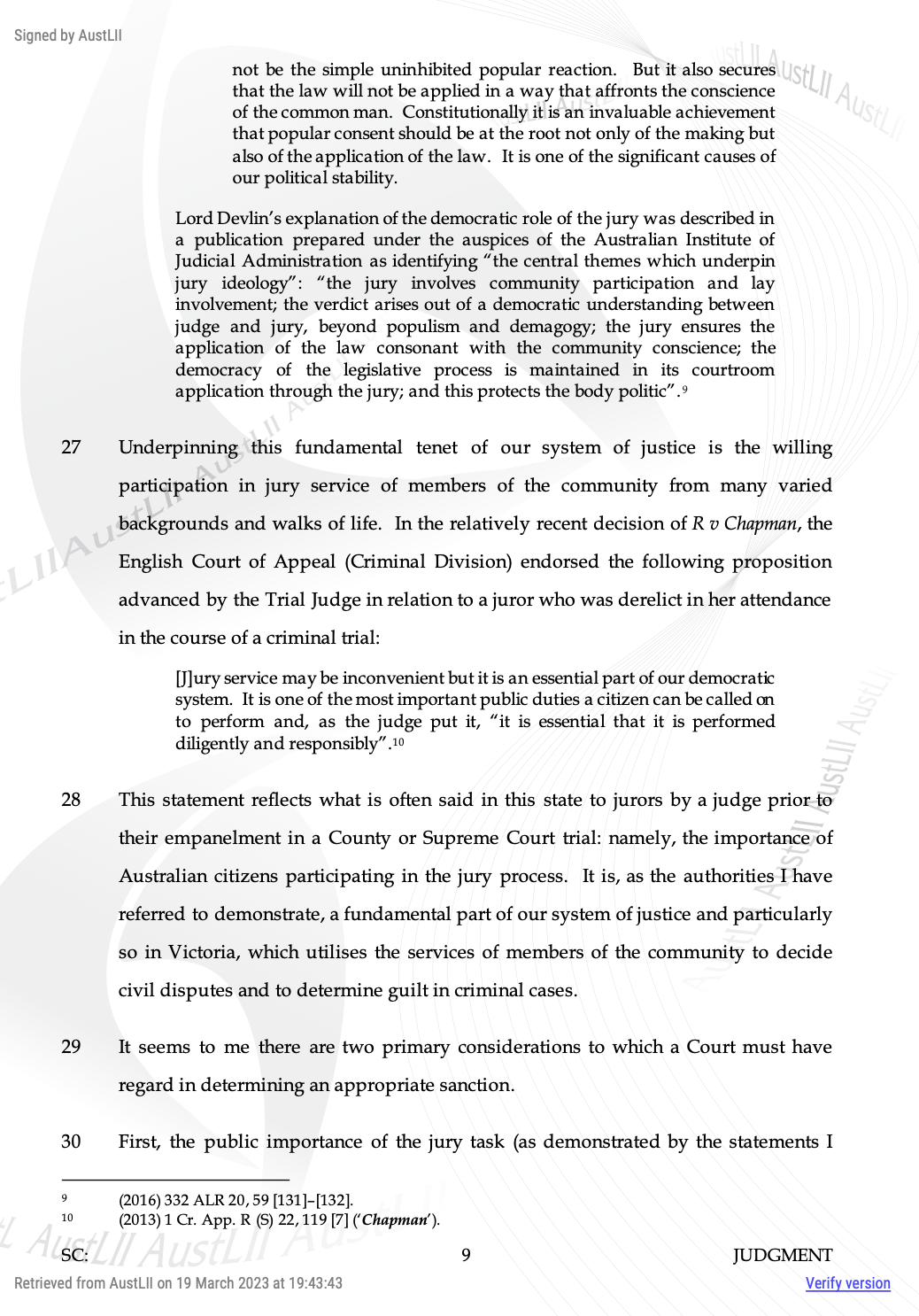
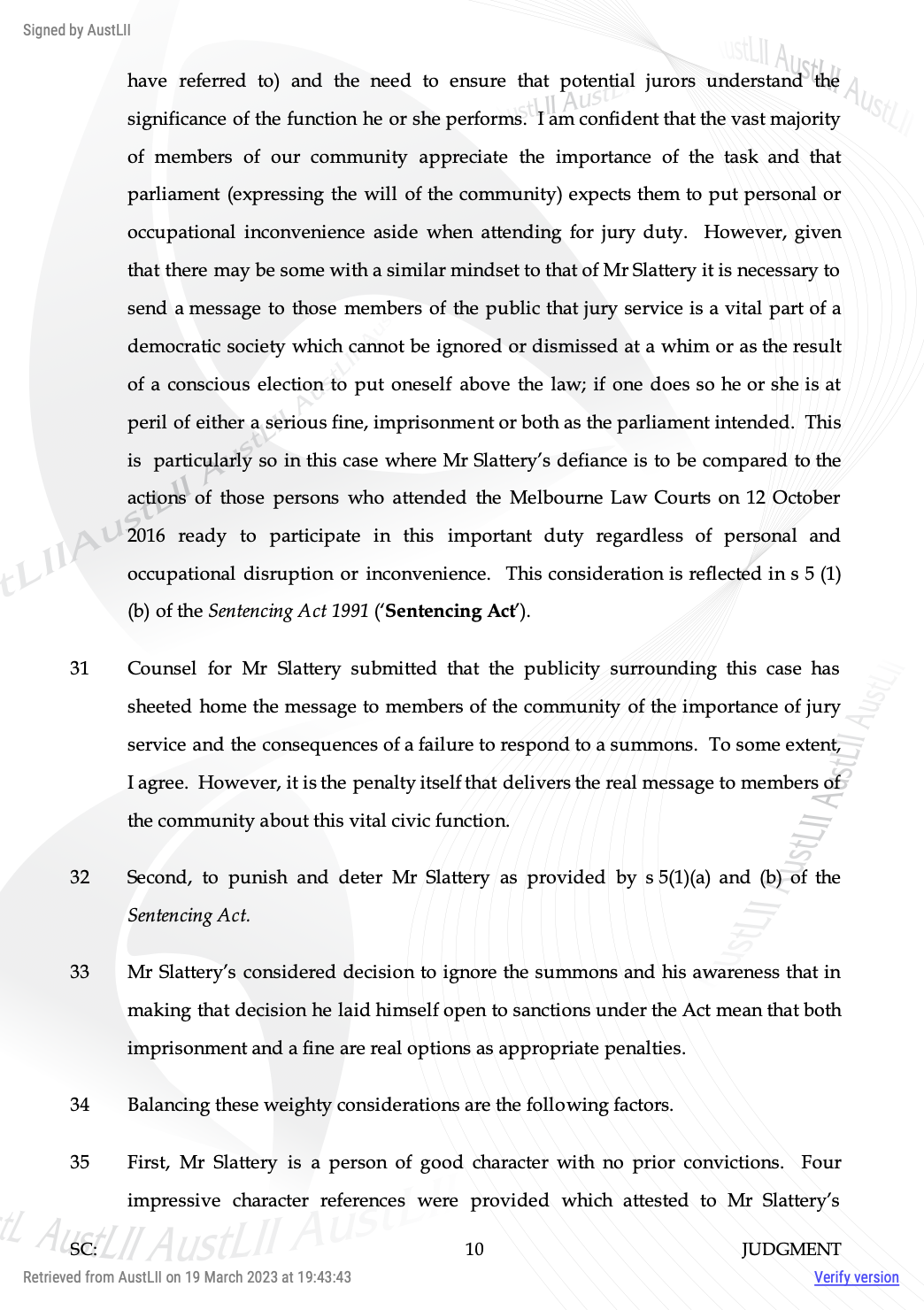
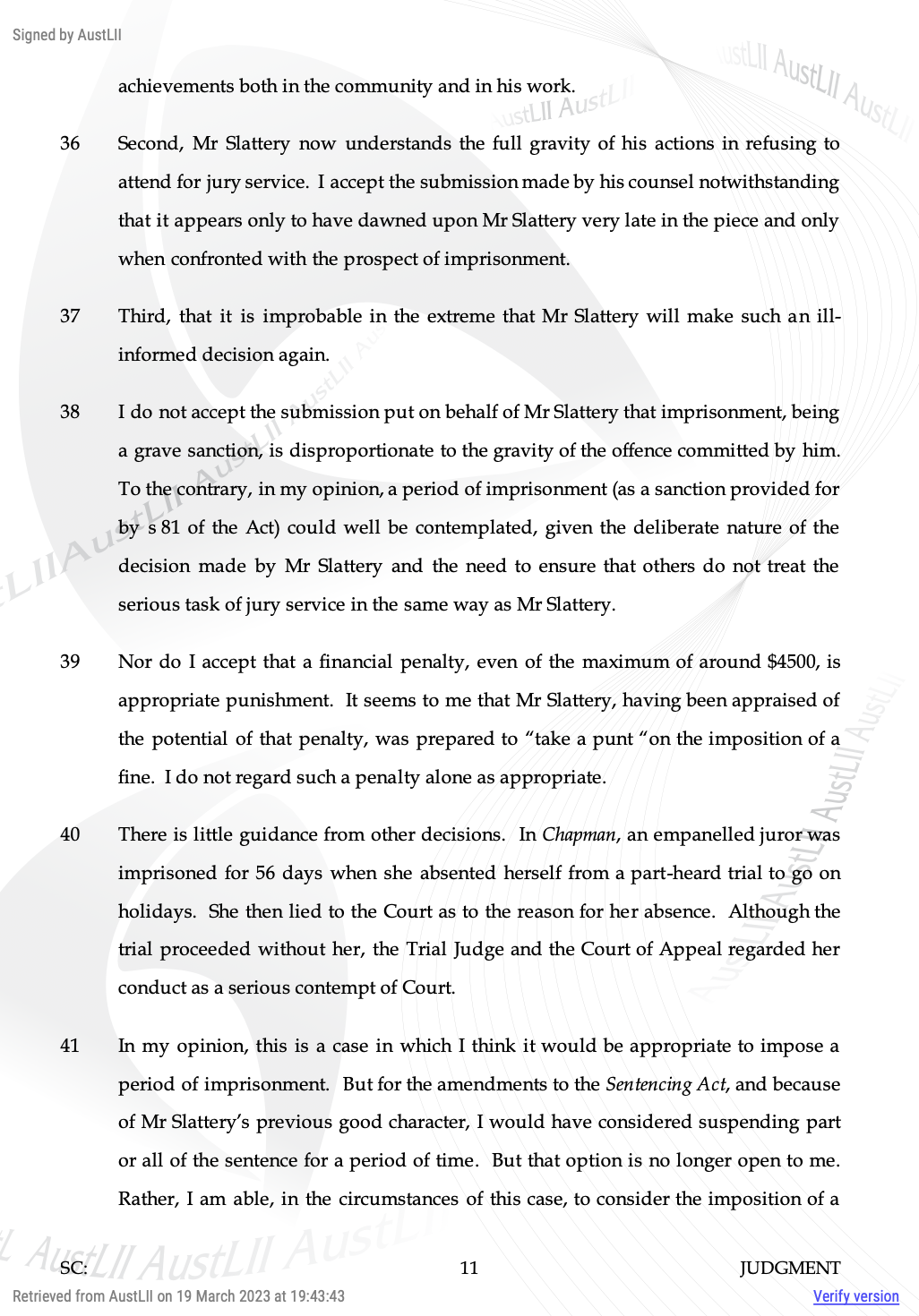
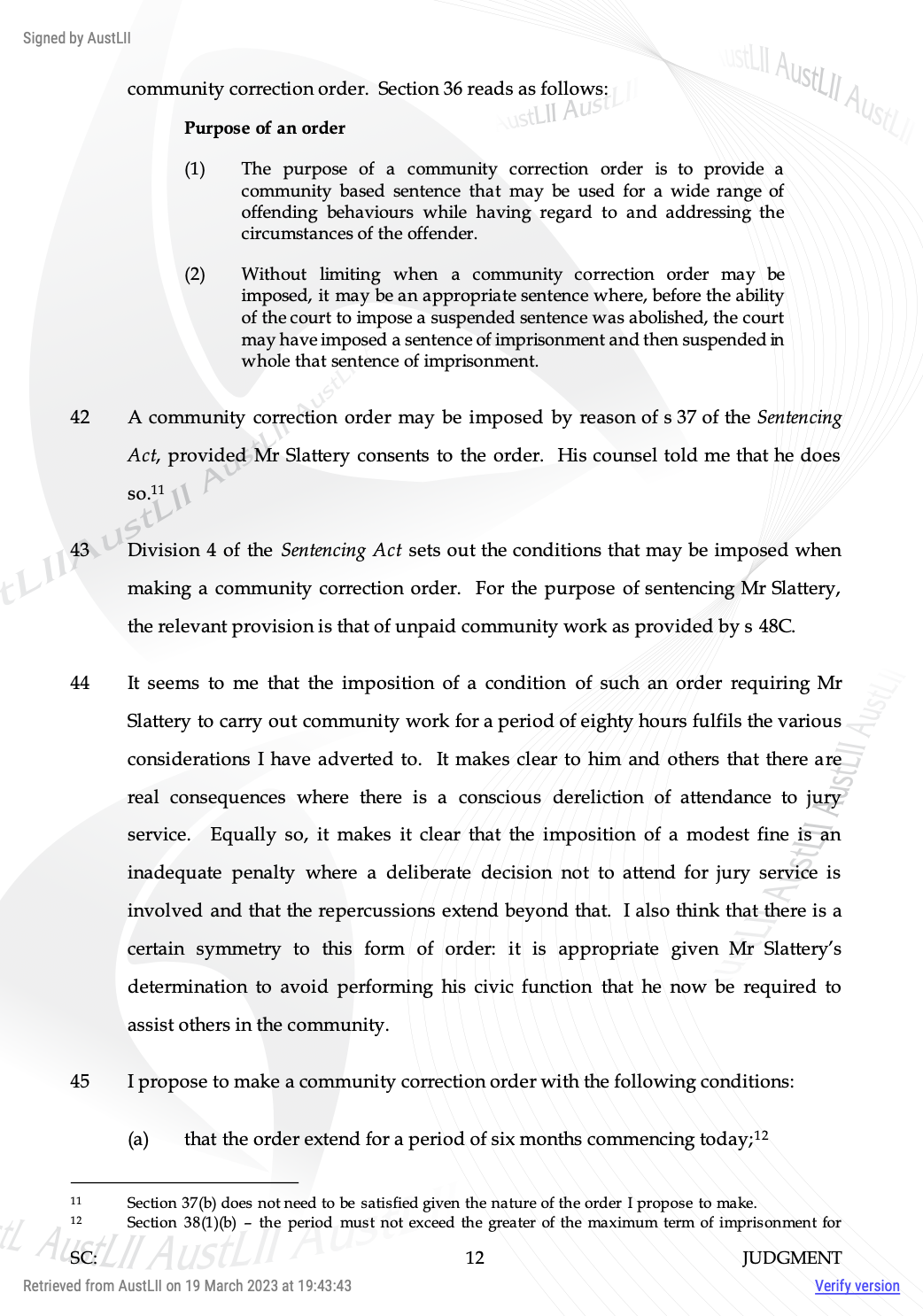
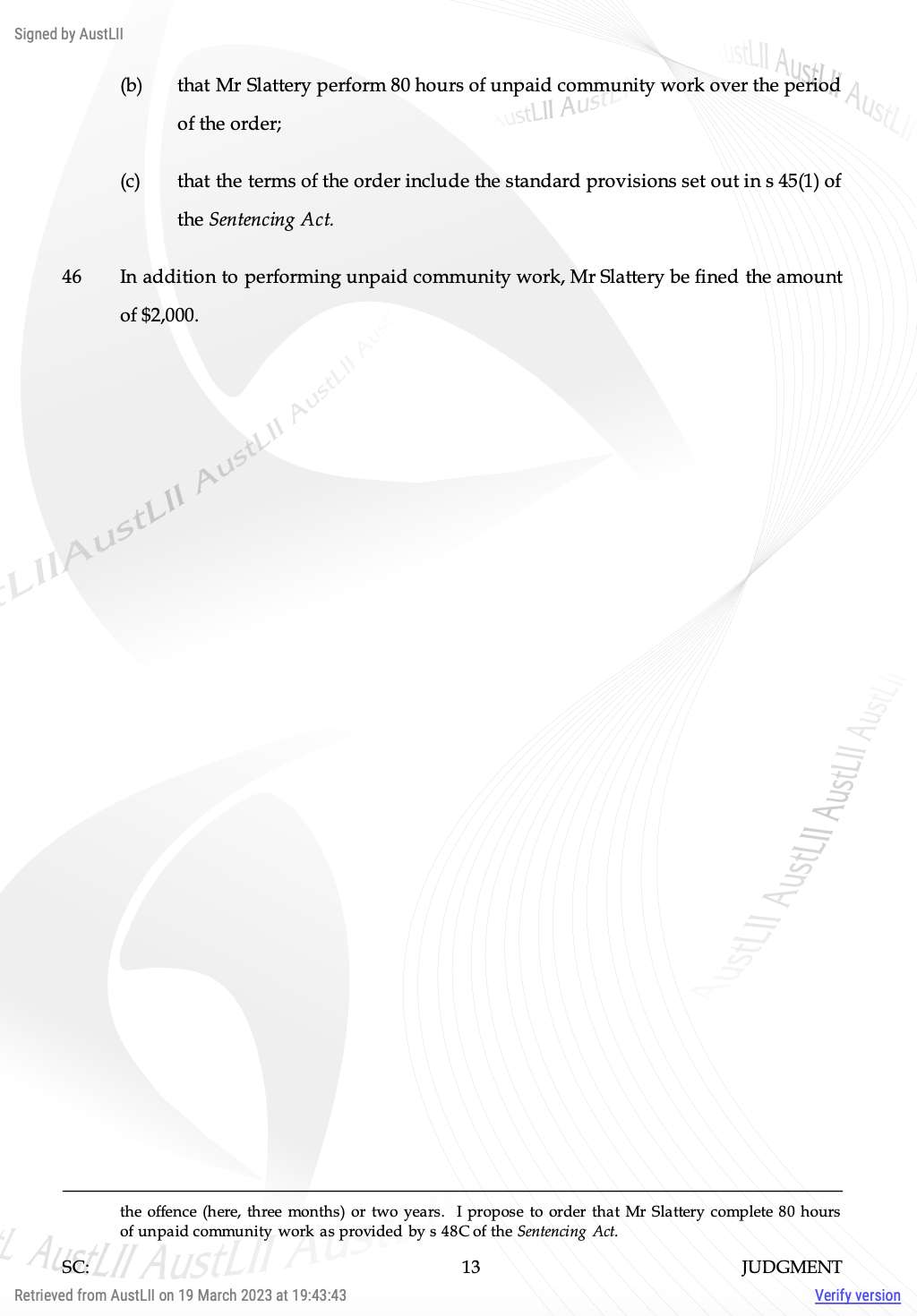
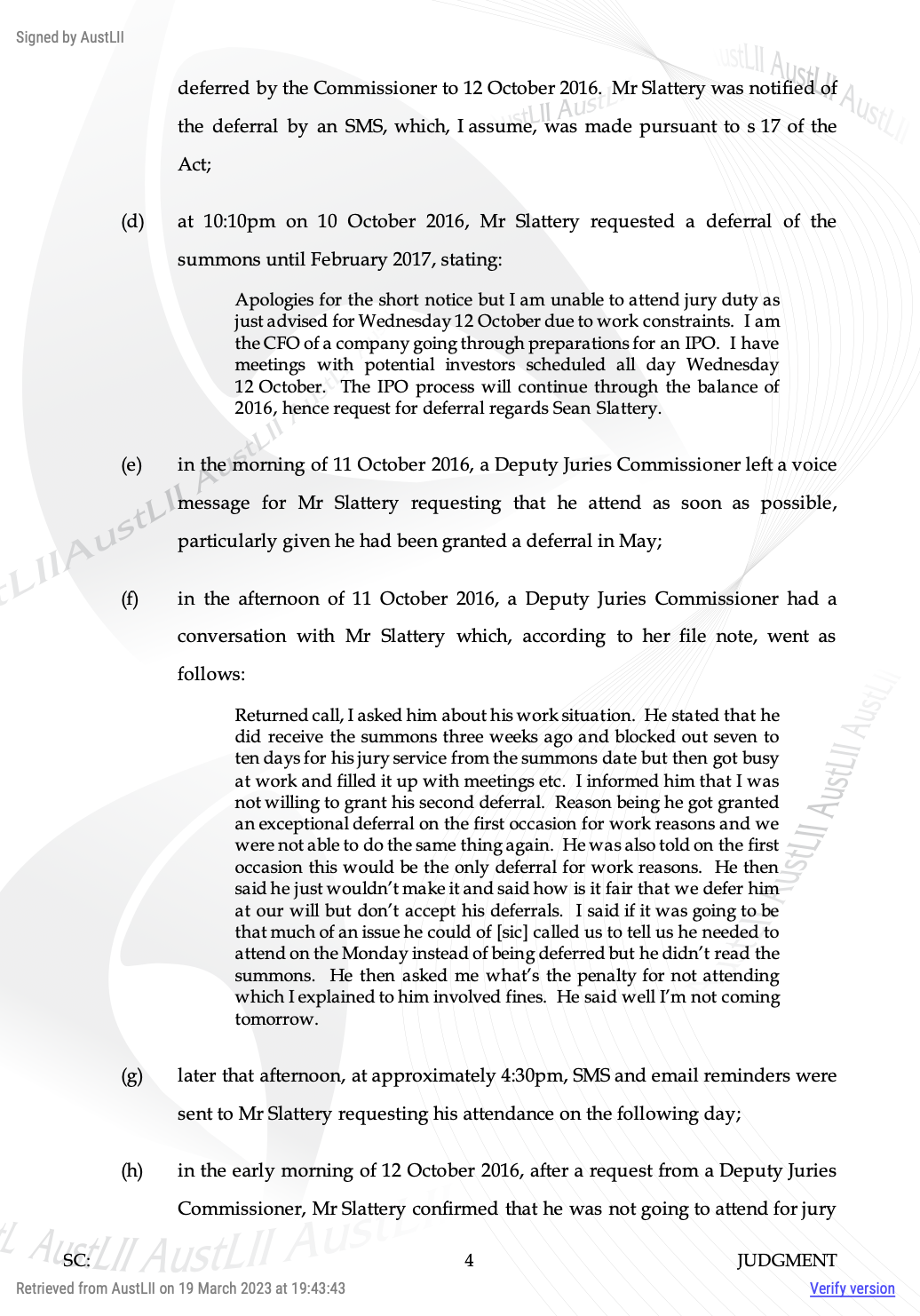
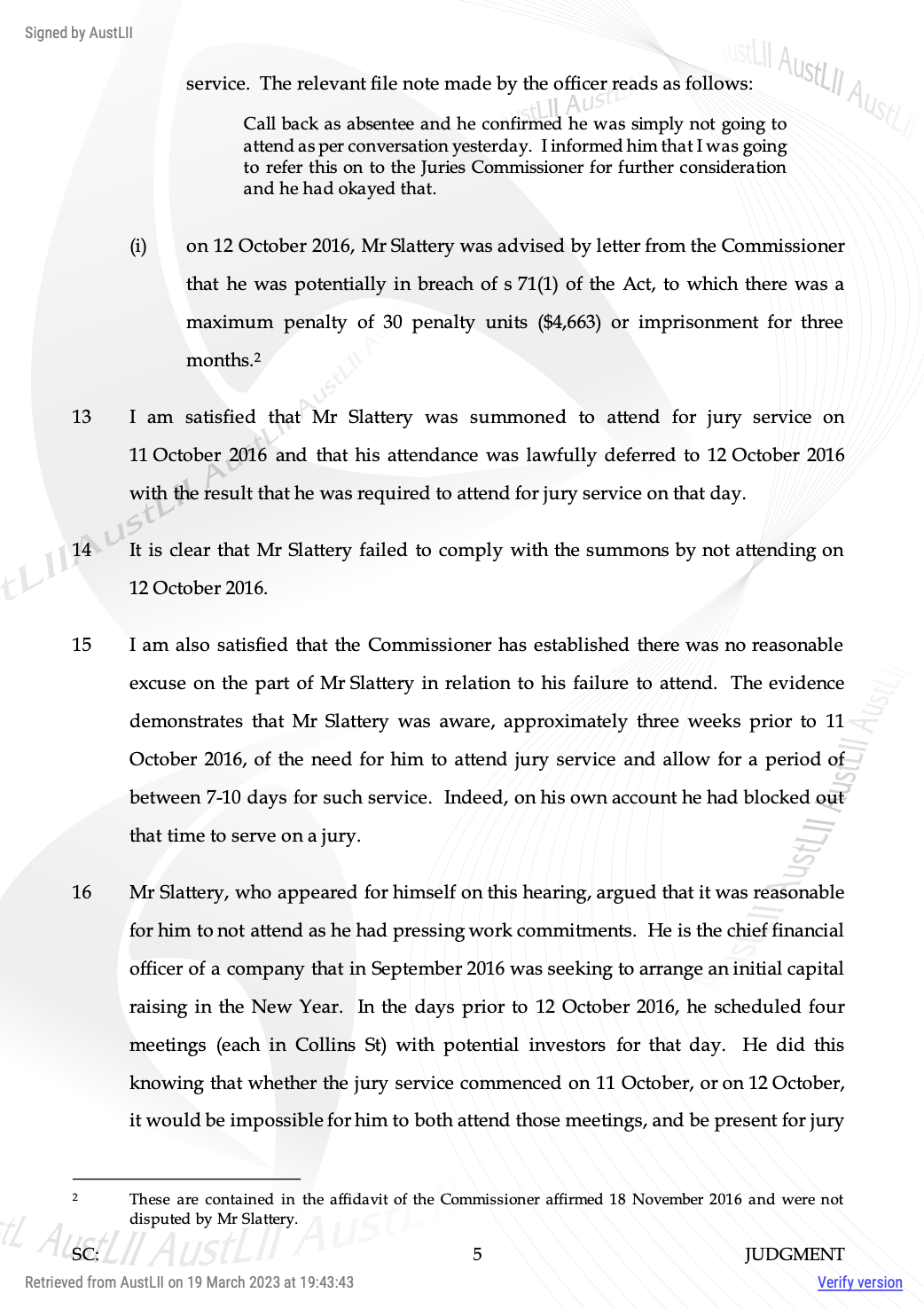
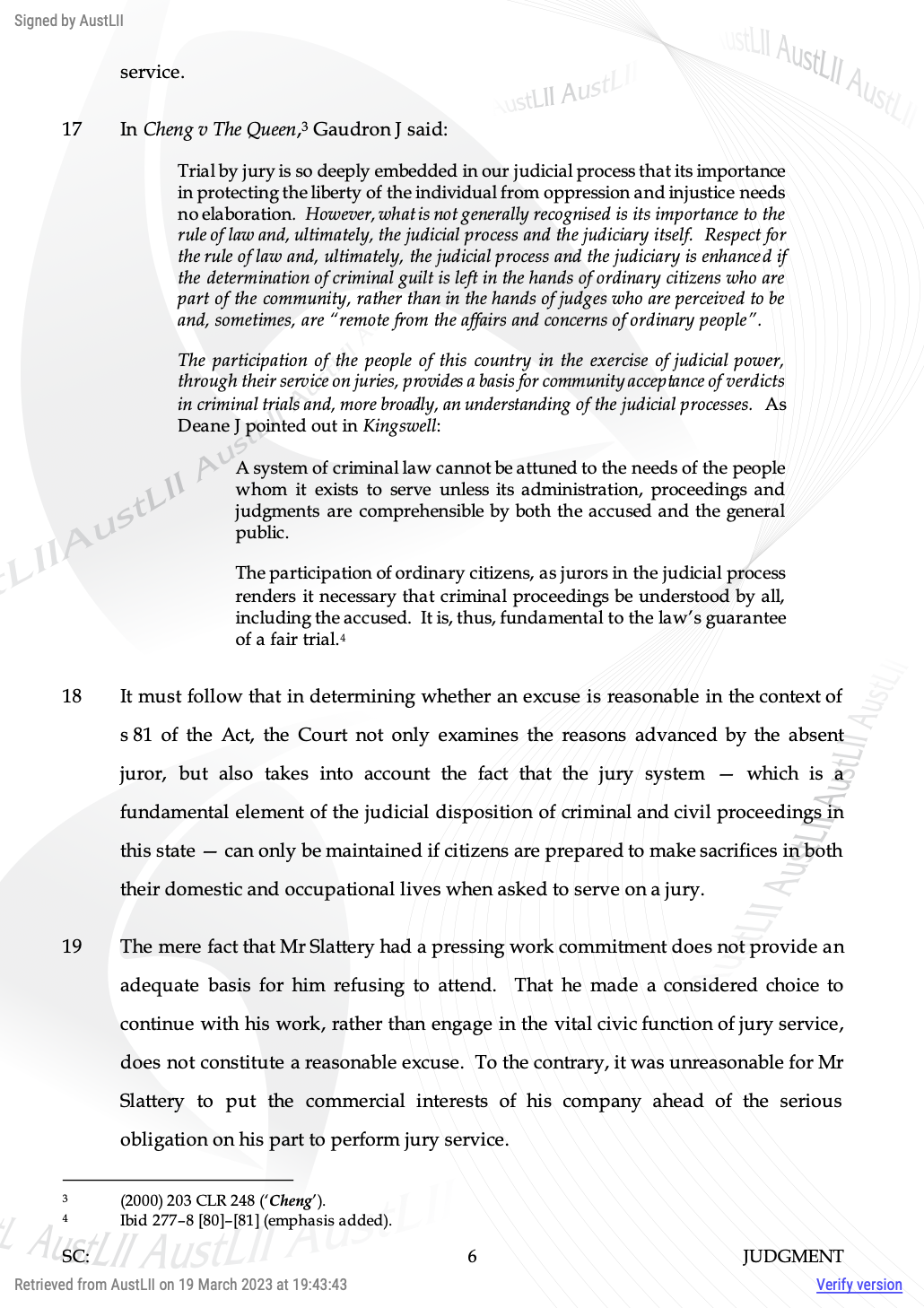
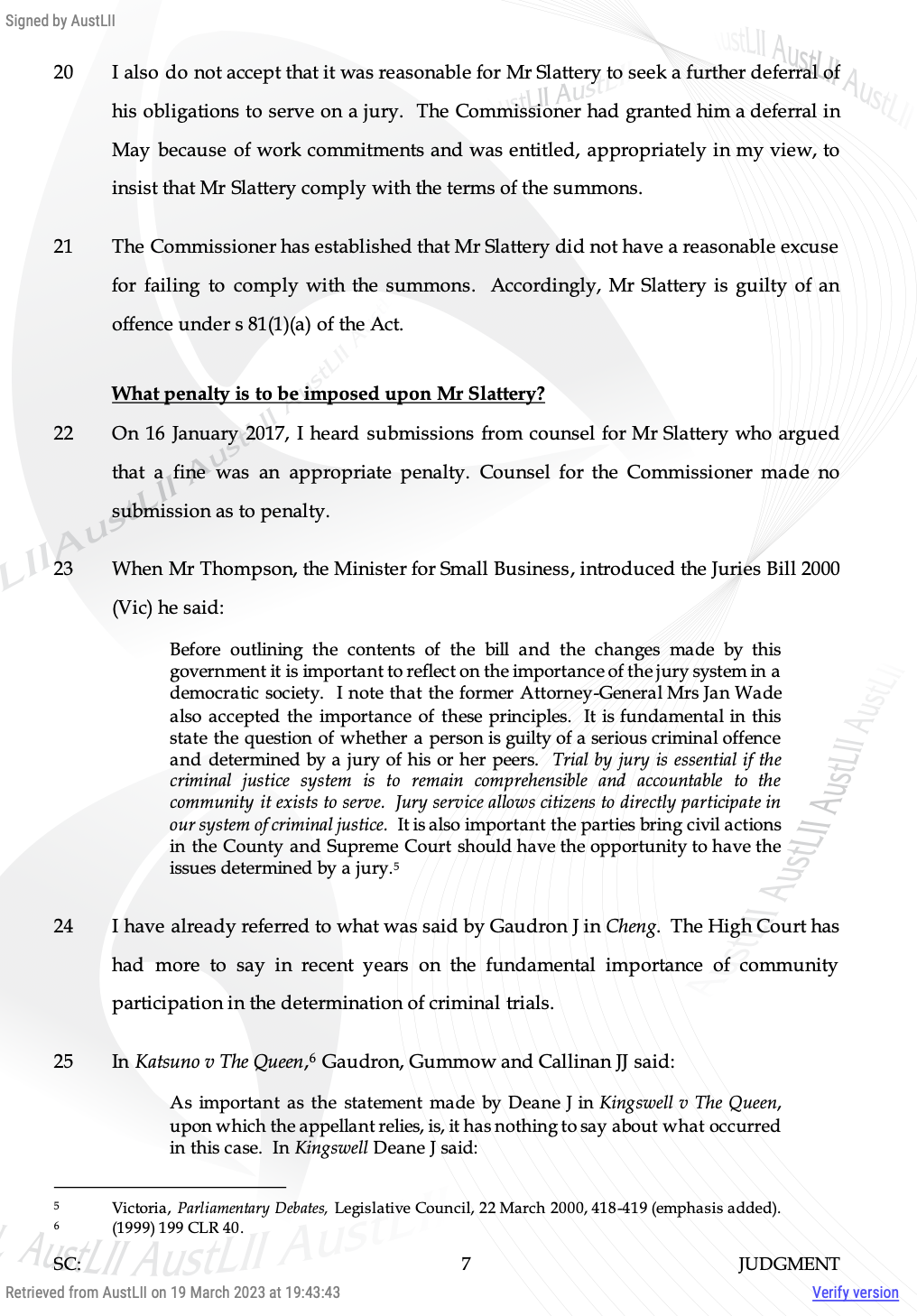
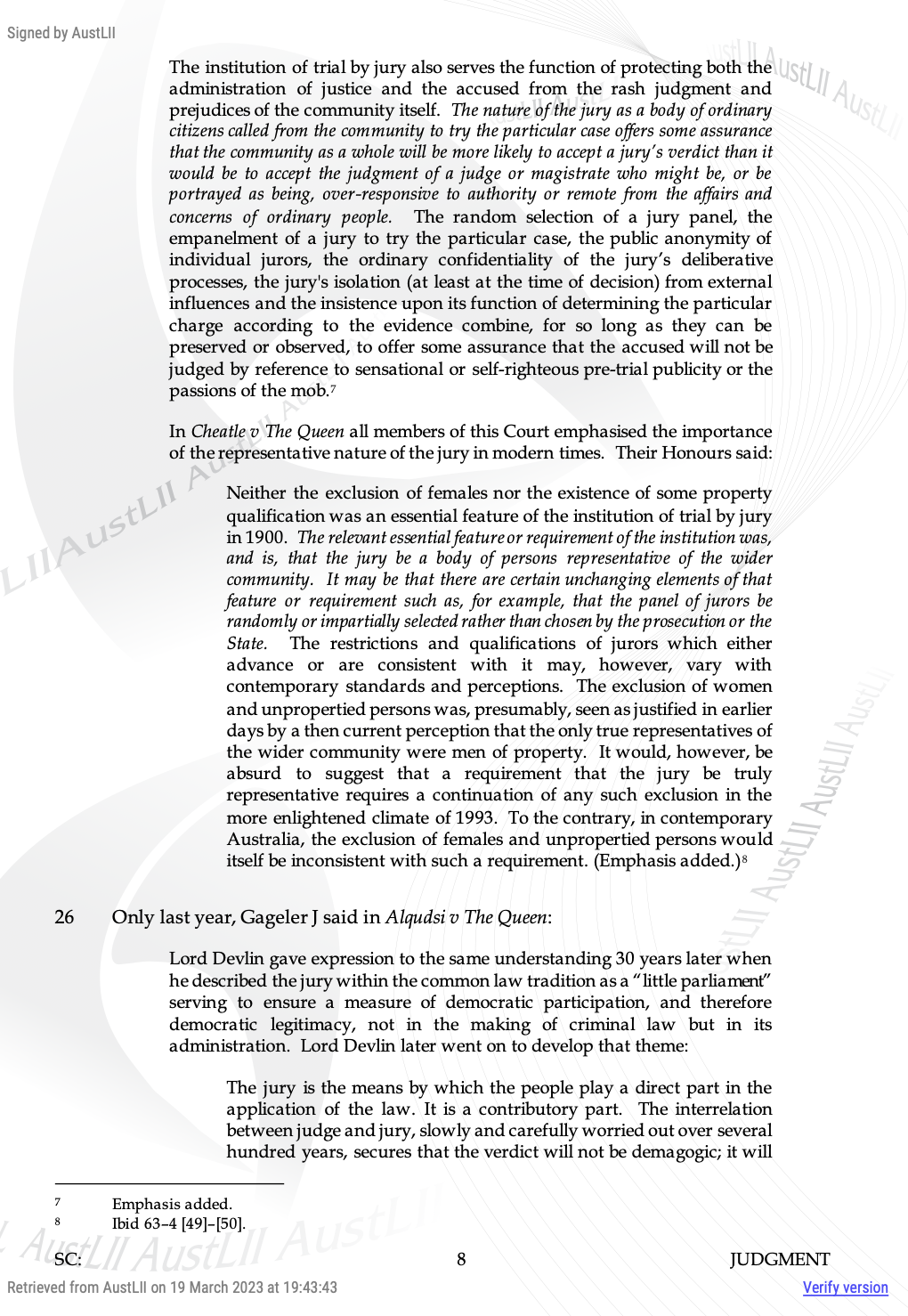
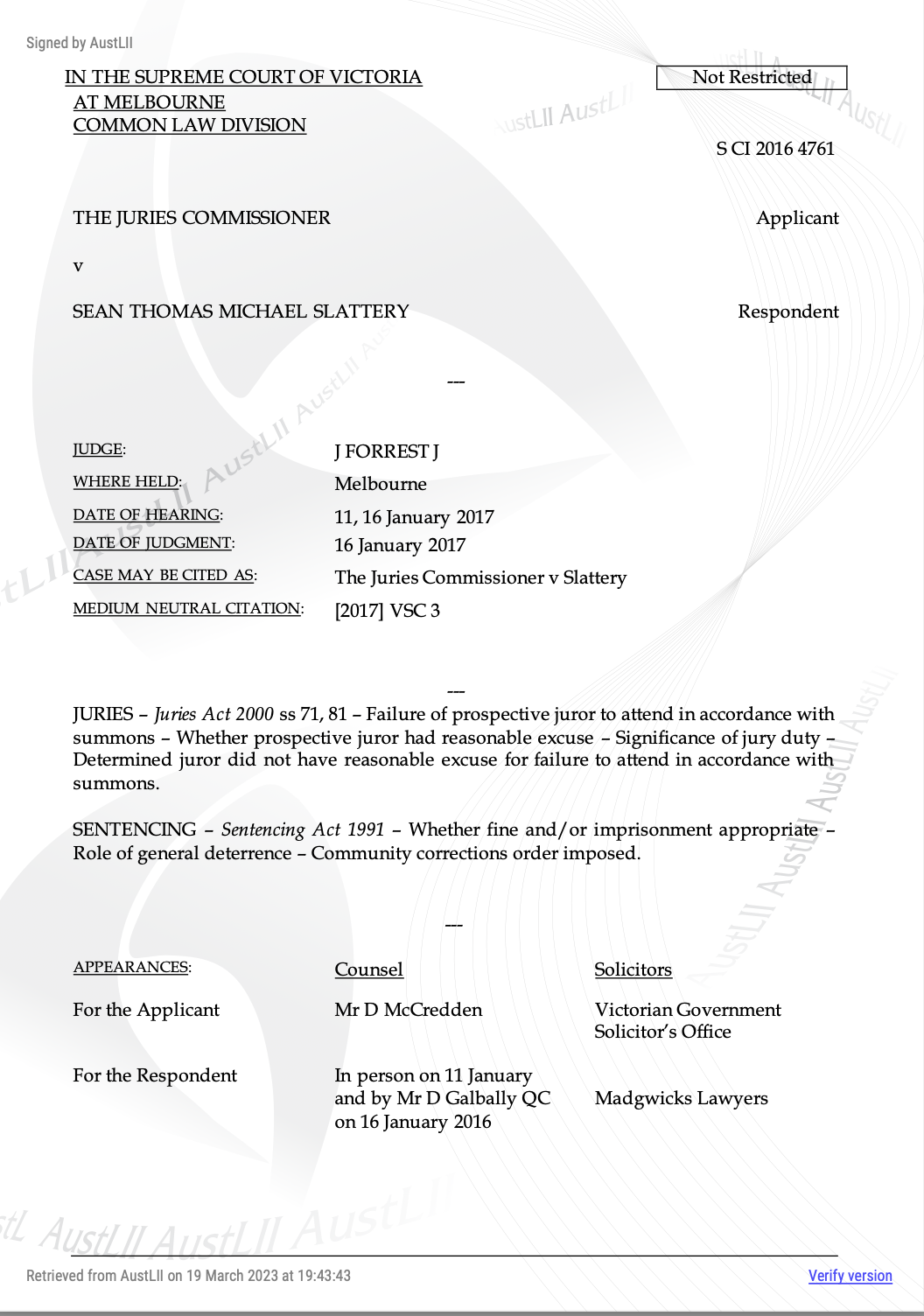
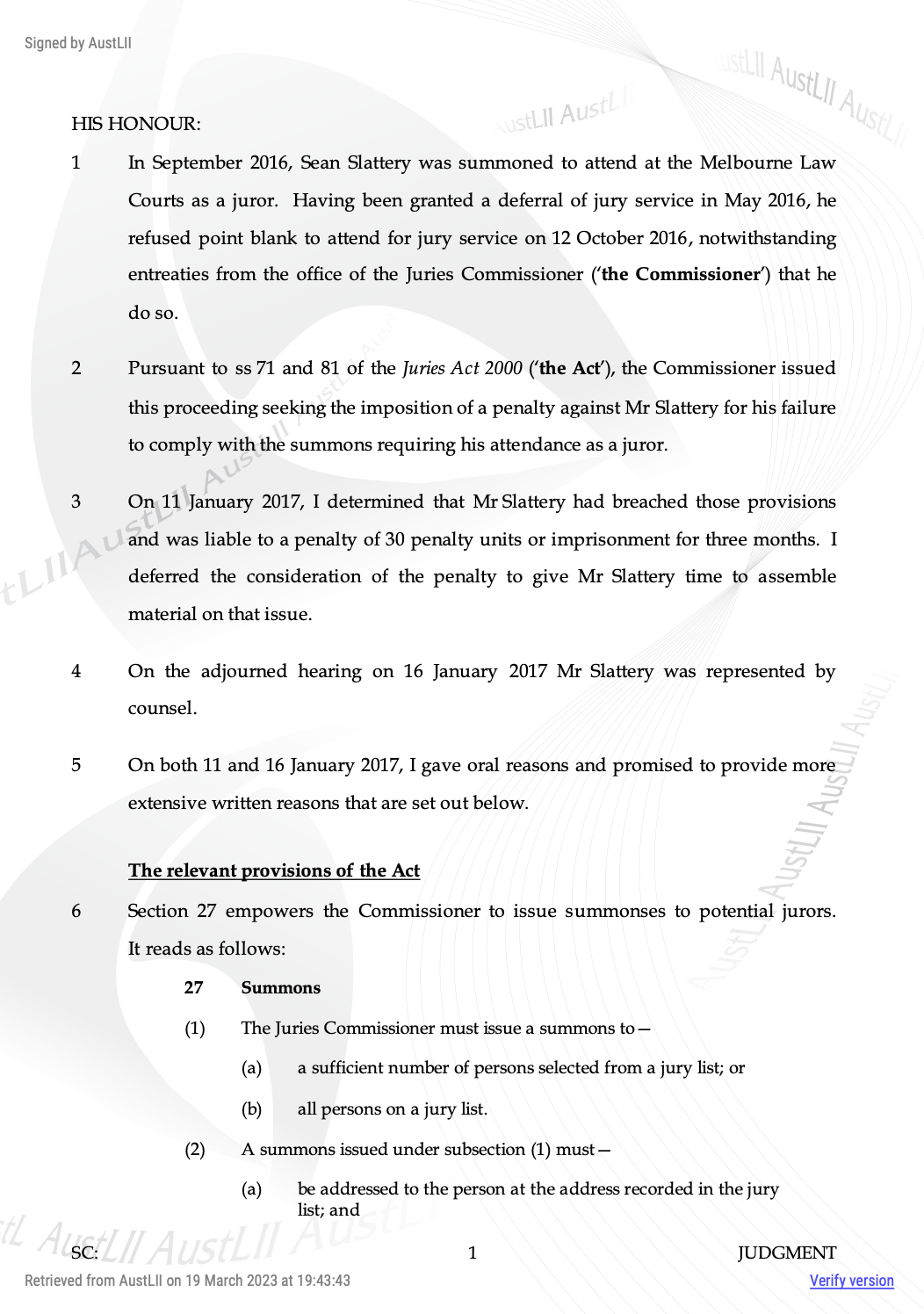
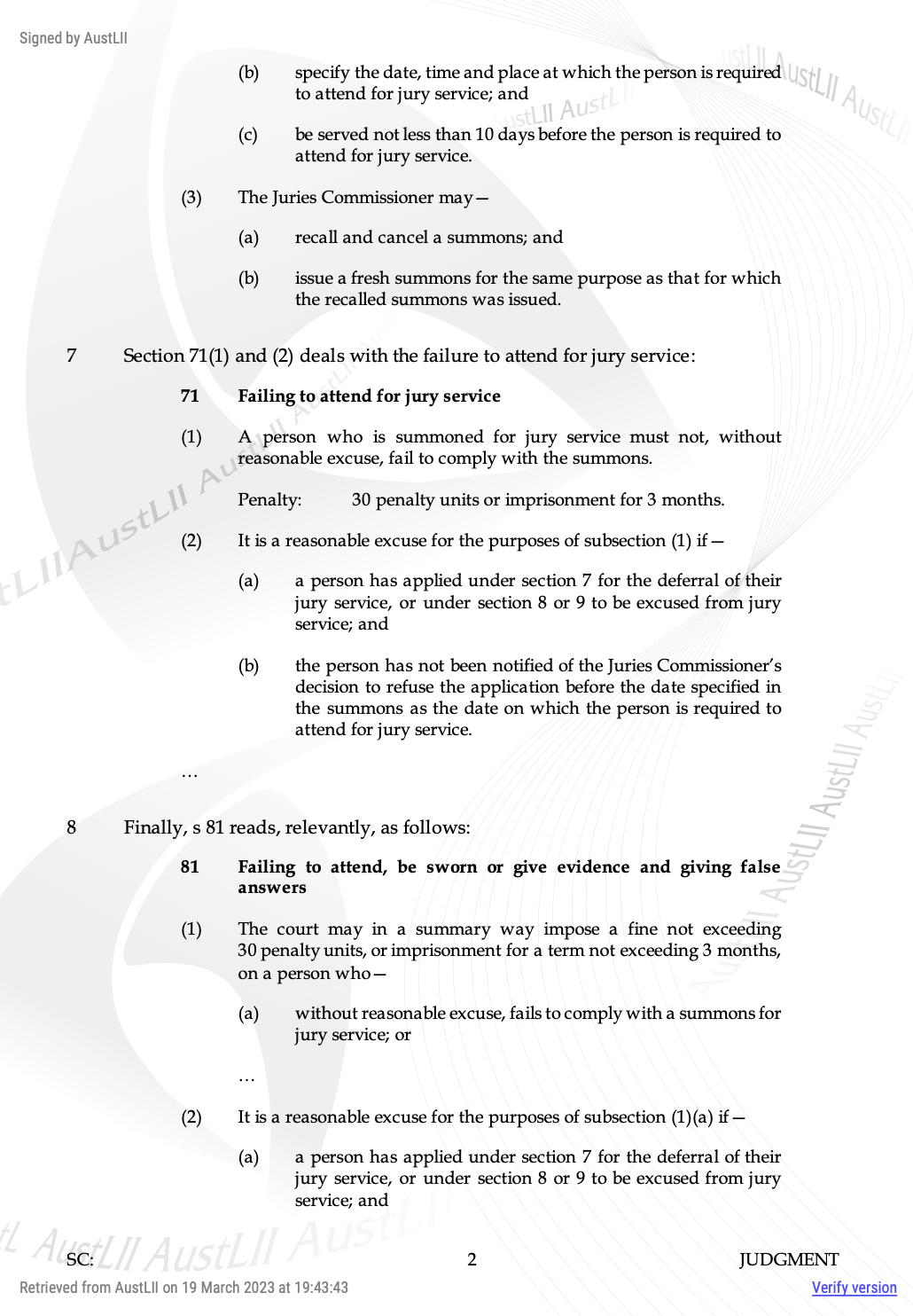
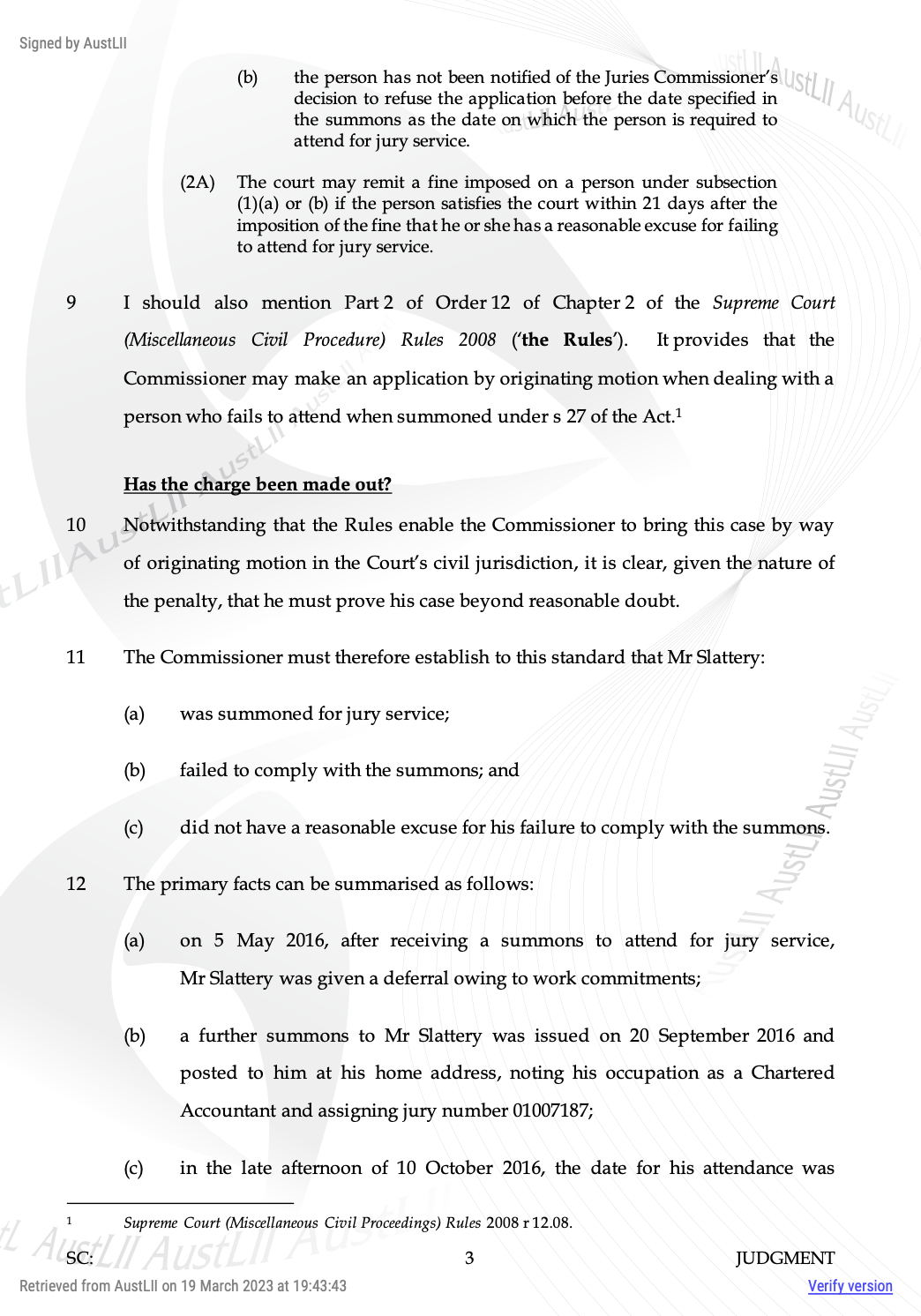
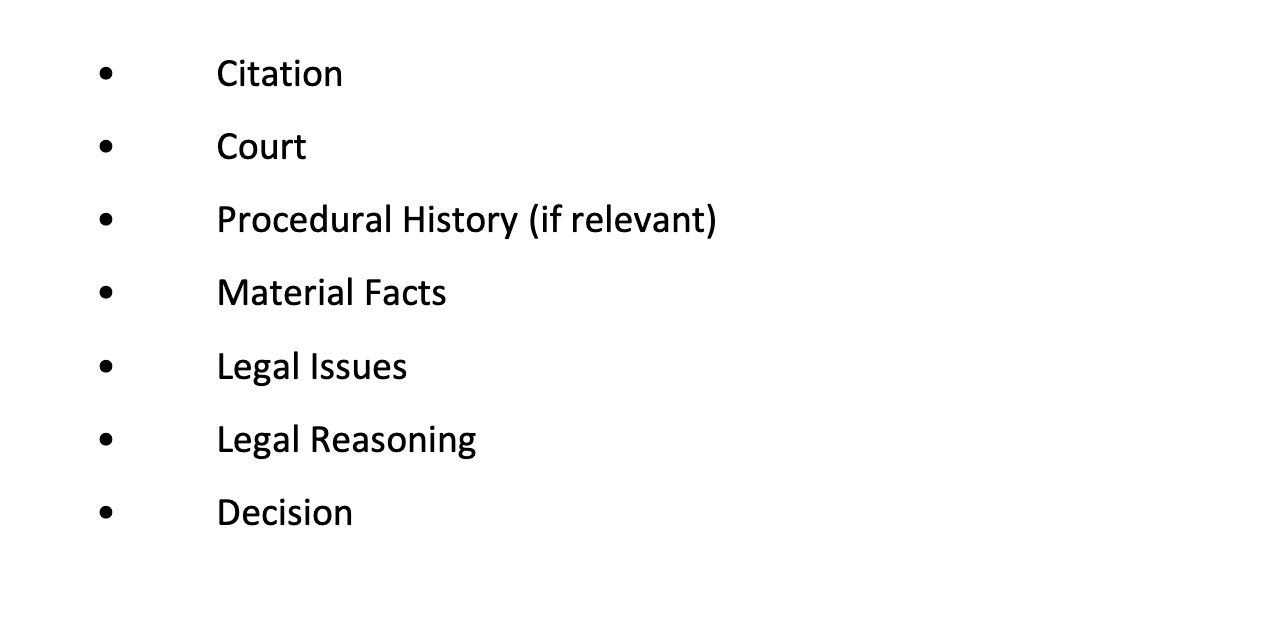
Signed by AustLII 27 LIIAU 28 29 30 tres ustLII AustLII not be the simple uninhibited popular reaction. But it also secures that the law will not be applied in a way that affronts the conscience of the common man. Constitutionally it is an invaluable achievement that popular consent should be at the root not only of the making but also of the application of the law. It is one of the significant causes of our political stability. Lord Devlin's explanation of the democratic role of the jury was described in a publication prepared under the auspices of the Australian Institute of Judicial Administration as identifying the central themes which underpin jury ideology": "the jury involves community participation and lay involvement; the verdict arises out of a democratic understanding between judge and jury, beyond populism and demagogy; the jury ensures the application of the law consonant with the community conscience; the democracy of the legislative process is maintained in its courtroom application through the jury; and this protects the body politic".9 this fundamental tenet of our system of justice is the willing in jury service of members of the community from many varied and walks of life. In the relatively recent decision of R v Chapman, the English Court of Appeal (Criminal Division) endorsed the following proposition advanced by the Trial Judge in relation to a juror who was derelict in her attendance in the course of a criminal trial: [J]ury service may be inconvenient but it is an essential part of our democratic system. It is one of the most important public duties a citizen can be called on to perform and, as the judge put it, "it is essential that it is performed diligently and responsibly".10 ustLII AustLI This statement reflects what is often said in this state to jurors by a judge prior to their empanelment in a County or Supreme Court trial: namely, the importance of Australian citizens participating in the jury process. It is, as the authorities I have referred to demonstrate, a fundamental part of our system of justice and particularly so in Victoria, which utilises the services of members of the community to decide civil disputes and to determine guilt in criminal cases. It seems to me there are two primary considerations to which a Court must have regard in determining an appropriate sanction. First, the public importance of the jury task (as demonstrated by the statements I 9 (2016) 332 ALR 20,59 [131]-[132]. 10 (2013) 1 Cr. App. R (S) 22, 119 [7] ('Chapman'). Alsci Lll AustLill SC: Retrieved from AustLII on 19 March 2023 at 19:43:43 9 JUDGMENT Verify version Signed by AustLII ustLII Austine AustLI have referred to) and the need to ensure that potential jurors understand the musth II Austr significance of the function he or she performs. I am confident that the vast majority of members of our community appreciate the importance of the task and that parliament (expressing the will of the community) expects them to put personal or occupational inconvenience aside when attending for jury duty. However, given that there may be some with a similar mindset to that of Mr Slattery it is necessary to send a message to those members of the public that jury service is a vital part of a democratic society which cannot be ignored or dismissed at a whim or as the result of a conscious to put oneself above the law; if one does so he or she is at peril of either a tLIIAU cu fine, imprisonment or both as the parliament intended. This 31 32 33 is so in this case where Mr Slattery's defiance is to be compared to the actions of those persons who attended the Melbourne Law Courts on 12 October 2016 ready to participate in this important duty regardless of personal and occupational disruption or inconvenience. This consideration is reflected in s 5 (1) (b) of the Sentencing Act 1991 ('Sentencing Act'). Counsel for Mr Slattery submitted that the publicity surrounding this case has sheeted home the message to members of the community of the importance of jury service and the consequences of a failure to respond to a summons. To some extent, I agree. However, it is the penalty itself that delivers the real message to members of the community about this vital civic function. stListLII Astell Aust Second, to punish and deter Mr Slattery as provided by s 5(1)(a) and (b) of the Sentencing Act. Mr Slattery's considered decision to ignore the summons and his awareness that in making that decision he laid himself open to sanctions under the Act mean that both imprisonment and a fine are real options as appropriate penalties. 34 Balancing these weighty considerations are the following factors. 35 First, Mr Slattery is a person of good character with no prior convictions. Four impressive character references were provided which attested to Mr Slattery's L AustLII AustLII Retrieved from AustLII on 19 March 2023 at 19:43:43 10 JUDGMENT Verify version Signed by AustLII 36 37 38 achievements both in the community and in his work. ustLII AustLII AustL AustLII AustLII Second, Mr Slattery now understands the full gravity of his actions in refusing to attend for jury service. I accept the submission made by his counsel notwithstanding that it appears only to have dawned upon Mr Slattery very late in the piece and only when confronted with the prospect of imprisonment. Third, that it is improbable in the extreme that Mr Slattery will make such an ill- informed decision again. I do not accept the is disproportionate to the gravity of the offence committed by him. LIAub the submit on behalf of Mr Slattery that imprisonment, being 39 40 41 a grave To the in my opinion, a period of imprisonment (as a sanction provided for s 81 of the Act) could well be contemplated, given the deliberate nature of the decision made by Mr Slattery and the need to ensure that others do not treat the serious task of jury service in the same way as Mr Slattery. Nor do I accept that a financial penalty, even of the maximum of around $4500, is appropriate punishment. It seems to me that Mr Slattery, having been appraised of the potential of that penalty, was prepared to "take a punt "on the imposition of a fine. I do not regard such a penalty alone as appropriate. AustLII Aust There is little guidance from other decisions. In Chapman, an empanelled juror was imprisoned for 56 days when she absented herself from a part-heard trial to go on holidays. She then lied to the Court as to the reason for her absence. Although the trial proceeded without her, the Trial Judge and the Court of Appeal regarded her conduct as a serious contempt of Court. In my opinion, this is a case in which I think it would be appropriate to impose a period of imprisonment. But for the amendments to the Sentencing Act, and because of Mr Slattery's previous good character, I would have considered suspending part or all of the sentence for a period of time. But that option is no longer open to me. Rather, I am able, in the circumstances of this case, to consider the imposition of a Alsc! LII AustLII Aust SC: Retrieved from AustLII on 19 March 2023 at 19:43:43 11 JUDGMENT Verify version Signed by AustLII 42 community correction order. Section 36 reads as Purpose of an order (1) (2) A community s follows: AustLII ustLII AustLII AustLI The purpose of a community correction order is to provide a community based sentence that may be used for a wide range of offending behaviours while having regard to and addressing the circumstances of the offender. Without limiting when a community correction order may be imposed, it may be an appropriate sentence where, before the ability of the court to impose a suspended sentence was abolished, the court may have imposed a sentence of imprisonment and then suspended in whole that sentence of imprisonment. Act, provider.ust tLII ustLII A 44 45 11 12 order may be imposed by reason of s 37 of the Sentencing Mr Slattery consents to the order. His counsel told me that he does Division 4 of the Sentencing Act sets out the conditions that may be imposed when making a community correction order. For the purpose of sentencing Mr Slattery, the relevant provision is that of unpaid community work as provided by s 48C. It seems to me that the imposition of a condition of such an order requiring Mr Slattery to carry out community work for a period of eighty hours fulfils the various considerations I have adverted to. It makes clear to him and others that there are ustell Aust real consequences where there is a conscious dereliction of attendance to jury service. Equally so, it makes it clear that the imposition of a modest fine is an inadequate penalty where a deliberate decision not to attend for jury service is involved and that the repercussions extend beyond that. I also think that there is a certain symmetry to this form of order: it is appropriate given Mr Slattery's determination to avoid performing his civic function that he now be required to assist others in the community. I propose to make a community correction order with the following conditions: (a) that the order extend for a period of six months commencing today;12 Section 37(b) does not need to be satisfied given the nature of the order I propose to make. Section 38(1)(b) - the period must not exceed the greater of the maximum term of imprisonment for HL Als: Lll AustLII SC: Retrieved from AustLII on 19 March 2023 at 19:43:43 12 JUDGMENT Verify version SC: Signed by AustLII (b) 46 (c) ustLII Aust that Mr Slattery perform 80 hours of unpaid city work over the period of the order; AustLII AustLII that the terms of the order include the standard provisions set out in s 45(1) of the Sentencing Act. In addition to performing unpaid community work, Mr Slattery be fined the amount of $2,000. LIIAustLII AustLII AustLII Aust ustLII AustLII AustLII AustLI the offence (here, three months) or two years. I propose to order that Mr Slattery complete 80 hours of unpaid community work as provided by s 48C of the Sentencing Act. Retrieved from AustLII on 19 March 2023 at 19:43:43 13 JUDGMENT Verify version Signed by AustLII (d) All Aust ustLII Aust of deferred by the Commissioner to 12 October 2016. Mr Slattery was notified the deferral by an SMS, which, I assume, was made pursuant to s 17 of the Act; AustLI at 10:10pm on 10 October 2016, Mr Slattery requested a deferral of the summons until February 2017, stating: in the Apologies for the short notice but I am unable to attend jury duty as just advised for Wednesday 12 October due to work constraints. I am the CFO of a company going through preparations for an IPO. I have meetings with potential investors scheduled all day Wednesday 12 October. The IPO process will continue through the balance of 2016, of 11 October 2016, a Deputy Juries Commissioner left a voice LIIAustLII A morence request for deferral regards Sean Slattery. (f) message for Mr Slattery requesting that he attend as soon as possible, particularly given he had been granted a deferral in May; in the afternoon of 11 October 2016, a Deputy Juries Commissioner had a conversation with Mr Slattery which, according to her file note, went as follows: ustLII AustLII AustLI Returned call, I asked him about his work situation. He stated that he did receive the summons three weeks ago and blocked out seven to ten days for his jury service from the summons date but then got busy at work and filled it up with meetings etc. I informed him that I was not willing to grant his second deferral. Reason being he got granted an exceptional deferral on the first occasion for work reasons and we were not able to do the same thing again. He was also told on the first occasion this would be the only deferral for work reasons. He then said he just wouldn't make it and said how is it fair that we defer him at our will but don't accept his deferrals. I said if it was going to be that much of an issue he could of [sic] called us to tell us he needed to attend on the Monday instead of being deferred but he didn't read the summons. He then asked me what's the penalty for not attending which I explained to him involved fines. He said well I'm not coming tomorrow. (g) later that afternoon, at approximately 4:30pm, SMS and email reminders were sent to Mr Slattery requesting his attendance on the following day; (h) in the early morning of 12 October 2016, after a request from a Deputy Juries Commissioner, Mr Slattery confirmed that he was not going to attend for jury LALII AustLII Aust SC: Retrieved from AustLII on 19 March 2023 at 19:43:43 4 JUDGMENT Verify version Signed by AustLII 13 (i) stLII AustLII AustLI service. The relevant file note made by the officer reads as follows: stLII Aust Call back as absentee and he confirmed he was simply not going to attend as per conversation yesterday. I informed him that I was going to refer this on to the Juries Commissioner for further consideration and he had okayed that. on 12 October 2016, Mr Slattery was advised by letter from the Commissioner that he was potentially in breach of s 71(1) of the Act, to which there was a maximum penalty of 30 penalty units ($4,663) or imprisonment for three months. I am satisfied the AustLII Au 11 October Mr Slattery was summoned to attend for jury service on and that his attendance was lawfully deferred to 12 October 2016 with the result that he was required to attend for jury service on that day. It is clear that Mr Slattery failed to comply with the summons by not attending on 12 October 2016. 15 16 I am also satisfied that the Commissioner has established there was no reasonable excuse on the part of Mr Slattery in relation to his failure to attend. The evidence demonstrates that Mr Slattery was aware, approximately three weeks prior to 11 October 2016, of the need for him to attend jury service and allow for a period of between 7-10 days for such service. Indeed, on his own account he had blocked out that time to serve on a jury. ustLIIus Aust Mr Slattery, who appeared for himself on this hearing, argued that it was reasonable for him to not attend as he had pressing work commitments. He is the chief financial officer of a company that in September 2016 was seeking to arrange an initial capital raising in the New Year. In the days prior to 12 October 2016, he scheduled four meetings (each in Collins St) with potential investors for that day. He did this knowing that whether the jury service commenced on 11 October, or on 12 October, it would be impossible for him to both attend those meetings, and be present for jury 2 These are contained in the affidavit of the Commissioner affirmed 18 November 2016 and were not disputed by Mr Slattery. Fil Alscill Austin Aus SC: Retrieved from AustLII on 19 March 2023 at 19:43:43 5 JUDGMENT Verify version Signed by AustLII 17 service. In Cheng v The Queen, Gaudron J said: AustLII AustLII stLII AustLII AustLI Trial by jury is so deeply embedded in our judicial process that its importance in protecting the liberty of the individual from oppression and injustice needs no elaboration. However, what is not generally recognised is its importance to the rule of law and, ultimately, the judicial process and the judiciary itself. Respect for the rule of law and, ultimately, the judicial process and the judiciary is enhanced if the determination of criminal guilt is left in the hands of ordinary citizens who are part of the community, rather than in the hands of judges who are perceived to be and, sometimes, are "remote from the affairs and concerns of ordinary people". The participation of the people of this country in the exercise of judicial power, through their service on juries, provides a basis for community acceptance of verdicts in criminal trials and, more broadly, an understanding of the judicial processes. As Deane J out in Kingswell: LIIAustLII Aus Points A system of criminal law cannot be attuned to the needs of the people whom it exists to serve unless its administration, proceedings and judgments are comprehensible by both the accused and the general public. The participation of ordinary citizens, as jurors in the judicial process renders it necessary that criminal proceedings be understood by all, including the accused. It is, thus, fundamental to the law's guarantee of a fair trial.4 Stil Aust 18 19 It must follow that in determining whether an excuse is reasonable in the context of which is a s 81 of the Act, the Court not only examines the reasons advanced by the absent juror, but also takes into account the fact that the jury system fundamental element of the judicial disposition of criminal and civil proceedings in this state - can only be maintained if citizens are prepared to make sacrifices in both their domestic and occupational lives when asked to serve on a jury. The mere fact that Mr Slattery had a pressing work commitment does not provide an adequate basis for him refusing to attend. That he made a considered choice to continue with his work, rather than engage in the vital civic function of jury service, does not constitute a reasonable excuse. To the contrary, it was unreasonable for Mr Slattery to put the commercial interests of his company ahead of the serious obligation on his part to perform jury service. 3 (2000) 203 CLR 248 ('Cheng'). Ibid 277-8 [80]-[81] (emphasis added). AustLII AustLII SC: Retrieved from AustLII on 19 March 2023 at 19:43:43 6 JUDGMENT Verify version Signed by AustLII 20 21 SALJI Aust ustLII Austi of AustL I also do not accept that it was reasonable for Mr Slattery to seek a further deferral his obligations to serve on a jury. The Commissioner had granted him a deferral in May because of work commitments and was entitled, appropriately in my view, to insist that Mr Slattery comply with the terms of the summons. The Commissioner has established that Mr Slattery did not have a reasonable excuse for failing to comply with the summons. Accordingly, Mr Slattery is guilty of an offence under s 81(1)(a) of the Act. What penalty is to bed upon Mr Slattery? 22 On 16 23 24 25 25 5 that a I heard submissions from counsel for Mr Slattery who argued was an appropriate penalty. Counsel for the Commissioner made no as to penalty. When Mr Thompson, the Minister for Small Business, introduced the Juries Bill 2000 (Vic) he said: Before outlining the contents of the bill and the changes made by this government it is important to reflect on the importance of the jury system in a democratic society. I note that the former Attorney-General Mrs Jan Wade also accepted the importance of these principles. It is fundamental in this state the question of whether a person is guilty of a serious criminal offence and determined by a jury of his or her peers. Trial by jury is essential if the criminal justice system is to remain comprehensible and accountable to the community it exists to serve. Jury service allows citizens to directly participate in our system of criminal justice. It is also important the parties bring civil actions in the County and Supreme Court should have the opportunity to have the issues determined by a jury.5 AustLII AustLII AustLII I have already referred to what was said by Gaudron J in Cheng. The High Court has had more to say in recent years on the fundamental importance of community participation in the determination of criminal trials. In Katsuno v The Queen,6 Gaudron, Gummow and Callinan JJ said: As important as the statement made by Deane J in Kingswell v The Queen, upon which the appellant relies, is, it has nothing to say about what occurred in this case. In Kingswell Deane J said: Victoria, Parliamentary Debates, Legislative Council, 22 March 2000, 418-419 (emphasis added). (1999) 199 CLR 40. Alsc: Lll Austell Aus SC: Retrieved from AustLII on 19 March 2023 at 19:43:43 7 JUDGMENT Verify version Signed by AustLII the ustLII AustLI The institution of trial by jury also serves the function of protecting both the administration of justice and the accused from the rash judgment and prejudices of the community itself. The nature of the jury as a body of ordinary citizens called from the community to try the particular case offers some assurance that the community as a whole will be more likely to accept a jury's verdict than it would be to accept the judgment of a judge or magistrate who might be, or be portrayed as being, over-responsive to authority or remote from the affairs and concerns of ordinary people. The random selection of a jury panel, the empanelment of a jury to try the particular case, the public anonymity of individual jurors, the ordinary confidentiality of the jury's deliberative processes, the jury's isolation (at least at the time of decision) from external influences and the insistence upon its function of determining the particular charge according to the evidence combine, for so long as they can be preserved or observed, to offer some assurance that the accused will not be judged by reference to sensational or self-righteous pre-trial publicity or the passions of the mob.7 LIIAustLII Aetative n 26 7 In Cheatle v The Queen all members of this Court emphasised the importance of the nature of the jury in modern times. Their Honours said: Neither the exclusion of females nor the existence of some property qualification was an essential feature of the institution of trial by jury in 1900. The relevant essential feature or requirement of the institution was, and is, that the jury be a body of persons representative of the wider community. It may be that there are certain unchanging elements of that feature or requirement such as, for example, that the panel of jurors be randomly or impartially selected rather than chosen by the prosecution or the The restrictions and qualifications of jurors which either advance or are consistent with it may, however, vary with contemporary standards and perceptions. The exclusion of women and unpropertied persons was, presumably, seen as justified in earlier days by a then current perception that the only true representatives of the wider community were men of property. It would, however, be absurd to suggest that a requirement that the jury be truly representative requires a continuation of any such exclusion in the more enlightened climate of 1993. To the contrary, in contemporary Australia, the exclusion of females and unpropertied persons would itself be inconsistent with such a requirement. (Emphasis added.)8 State. Only last year, Gageler J said in Alqudsi v The Queen: LII AustLII AustLII AustLI Lord Devlin gave expression to the same understanding 30 years later when he described the jury within the common law tradition as a "little parliament" serving to ensure a measure of democratic participation, and therefore democratic legitimacy, not in the making of criminal law but in its administration. Lord Devlin later went on to develop that theme: The jury is the means by which the people play a direct part in the application of the law. It is a contributory part. The interrelation between judge and jury, slowly and carefully worried out over several hundred years, secures that the verdict will not be demagogic; it will Emphasis added. Ibid 63-4 [49]-[50]. AustLII AustLII AustLI Retrieved from AustLII on 19 March 2023 at 19:43:43 8 JUDGMENT Verify version Signed by AustLII IN THE SUPREME COURT OF VICTORIA AT MELBOURNE COMMON LAW DIVISION THE JURIES COMMISSIONER V SEAN THOMAS MICHAEL SLATTERY AustLII AustLII JUDGE: LIAT AustLII AustLII Aus WHERE HELD: DATE OF HEARING: DATE OF JUDGMENT: CASE MAY BE CITED AS: MEDIUM NEUTRAL CITATION: J FORREST J Melbourne 11, 16 January 2017 16 January 2017 The Juries Commissioner v Slattery [2017] VSC 3 Not Restricted AustLII SCI 2016 4761 Applicant Respondent JURIES Juries Act 2000 ss 71, 81 - Failure of prospective juror to attend in accordance with summons - Whether prospective juror had reasonable excuse - Significance of jury duty - Determined juror did not have reasonable excuse for failure to attend in accordance with summons. AustLII Aust Aust AustLI SENTENCING - Sentencing Act 1991 - Whether fine and/or imprisonment appropriate Role of general deterrence - Community corrections order imposed. Solicitors APPEARANCES: For the Applicant Counsel Mr D McCredden Victorian Government Solicitor's Office For the Respondent In person on 11 January and by Mr D Galbally QC on 16 January 2016 iL AustLII AustLII AustLII Retrieved from AustLII on 19 March 2023 at 19:43:43 Madgwicks Lawyers Verify version Signed by AustLII 2 HIS HONOUR: 1 AustLII AustLII stLII AustLII AustLII In September 2016, Sean Slattery was summoned to attend at the Melbourne Law Courts as a juror. Having been granted a deferral of jury service in May 2016, he refused point blank to attend for jury service on 12 October 2016, notwithstanding entreaties from the office of the Juries Commissioner ('the Commissioner') that he do so. Pursuant to ss 71 and 81 this proceedings to comply with Austi the Juries Act 2000 ('the Act'), the Commissioner issued the imposition of a penalty against Mr Slattery for his failure summons requiring his attendance as a juror. tLIIAust Austro 4 3 On January 2017, I determined that Mr Slattery had breached those provisions and was liable to a penalty of 30 penalty units or imprisonment for three months. I deferred the consideration of the penalty to give Mr Slattery time to assemble material on that issue. 5 On the adjourned hearing on 16 January 2017 Mr Slattery was represented by counsel. On both 11 and 16 January 2017, I gave oral reasons and promised to provide more extensive written reasons that are set out below. The relevant provisions of the Act AustAustLII Austell AustLI 6 Section 27 empowers the Commissioner to issue summonses to potential jurors. It reads as follows: 27 Summons (1) The Juries Commissioner must issue a summons to- (a) a sufficient number of persons selected from a jury list; or (b) all persons on a jury list. (2) A summons issued under subsection (1) must - (a) be addressed to the person at the address recorded in the jury list; and =tL AuscLII AustLII Austr Retrieved from AustLII on 19 March 2023 at 19:43:43 1 JUDGMENT Verify version Signed by AustLII (b) (c) (3) specify the date, time and place at which the to attend for jury service; and stLII AustLI e person is required USTLII AustL be served not less than 10 days before the person is required to attend for jury service. The Juries Commissioner may - (a) recall and cancel a summons; and (b) issue a fresh summons for the same purpose as that for which the recalled summons was issued. 7 Section 71(1) and (2) deals with the failure to attend for jury service: Failing to attend for jury service 71 (1) A Penalty: LIIAustLII Aure (2) who is summoned for jury service must not, without e excuse, fail to comply with the summons. 30 penalty units or imprisonment for 3 months. It is a reasonable excuse for the purposes of subsection (1) if - (a) a person has applied under section 7 for the deferral of their jury service, or under section 8 or 9 to be excused from jury service; and (b) the person has not been notified of the Juries Commissioner's decision to refuse the application before the date specified in the summons as the date on which the person is required to attend for jury service. 8 AustLII AustLII AustL Finally, s 81 reads, relevantly, as follows: 81 Failing to attend, be sworn or give evidence and giving false (1) answers The court may in a summary way impose a fine not exceeding 30 penalty units, or imprisonment for a term not exceeding 3 months, on a person who- (a) without reasonable excuse, fails to comply with a summons for jury service; or (2) It is a reasonable excuse for the purposes of subsection (1)(a) if - (a) a person has applied under section 7 for the deferral of their jury service, or under section 8 or 9 to be excused from jury service; and #AustLII AustLII Aust SC: Retrieved from AustLII on 19 March 2023 at 19:43:43 2 JUDGMENT Verify version Signed by AustLII (b) 9 Sher's ustLII AustLII the person has not been notified of the Juries Commissioner's decision to refuse the application before the date specified in the summons as the date on which the person is required to attend for jury service. (2A) The court may remit a fine imposed on a person under subsection (1)(a) or (b) if the person satisfies the court within 21 days after the imposition of the fine that he or she has a reasonable excuse for failing to attend for jury service. I should also mention Part 2 of Order 12 of Chapter 2 of the Supreme Court (Miscellaneous Civil Procedure) Rules 2008 ('the Rules'). It provides that the Commissioner may an application by originating motion when dealing with a when summoned under s 27 of the Act.1 person who fails to been made out? Has the chart ELIIAUotwithstanding t 11 12 that the Rules enable the Commissioner to bring this case by way of originating motion in the Court's civil jurisdiction, it is clear, given the nature of the penalty, that he must prove his case beyond reasonable doubt. The Commissioner must therefore establish to this standard that Mr Slattery: (c) was summoned for jury service; failed to comply with the summons; and AustAustLII AustL did not have a reasonable excuse for his failure to comply with the summons. The primary facts can be summarised as follows: (a) (b) on 5 May 2016, after receiving a summons to attend for jury service, Mr Slattery was given a deferral owing to work commitments; a further summons to Mr Slattery was issued on 20 September 2016 and posted to him at his home address, noting his occupation as a Chartered Accountant and assigning jury number 01007187; in the late afternoon of 10 October 2016, the date for his attendance was Supreme Court (Miscellaneous Civil Proceedings) Rules 2008 r 12.08. SC: Retrieved from AustLII on 19 March 2023 at 19:43:43 3 JUDGMENT Verify version Citation Court Procedural History (if relevant) Material Facts Legal Issues Legal Reasoning Decision
Step by Step Solution
There are 3 Steps involved in it
Step: 1

Get Instant Access to Expert-Tailored Solutions
See step-by-step solutions with expert insights and AI powered tools for academic success
Step: 2

Step: 3

Ace Your Homework with AI
Get the answers you need in no time with our AI-driven, step-by-step assistance
Get Started


